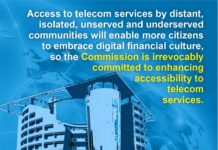By Etim Etim

It is quite notable that in the welter of the crisis that has engulfed his party, Professor Yemi Osinbajo managed to stay aloof and concentrate on his work as the nation’s chief economic technocrat.
While Bola Tinubu, Adams Oshiomohole, Dr Femi Kayode and other APC chieftains spent the last six months scheming for the soul of the governing party and how to position themselves for 2023, the Vice President was hard at work hammering out an economic emergency plan for the country. Dubbed National Economic Sustainability Plan (NESP), the initiative was unveiled mid-June and approved by FEC a few days after.
The NESP is developed as a 12-month, N2.3 Trillion Naira ‘Transit’ Plan between the Economic Recovery and Growth Plan (ERGP) which expires this December and the successor plan to the ERGP, which is currently in development. I commend the Vice President for the thoroughness, comprehensiveness and detailed articulation of the Plan.
I can only hope that its implementation will receive the same level of care.
The NESP has eight key intervention priority areas: Cultivation of 20,000 ha – 100,000 ha of new farmland; public works and road construction program; mass housing program to deliver 300,000 homes every year; solar electricity for five million households and support for the informal sector. Others are business support for MSMES and expansion of the Social Investment Program.
The federal government is proposing to pump N2.3 trillion into these focal areas in the next year in order to minimize the extent of our plunge into recession. The NESP seeks to achieve the following key objectives: stimulate the economy by preventing business collapse and ensuring liquidity; retain and create jobs in labor-intensive areas like agriculture, housing development, public works, etc, and investing heavily in infrastructure.
The plan will be funded as follows: N500 billion from Special FGN Accounts; N1.1 trillion from the CBN in the form of structured lending; N334 billion from external bilateral/multilateral sources and N302.9 billion from other funding sources.
In terms of local content and domestic production, the plan promotes local production of goods and services, local innovation, and the use of local materials, in line with the Mandate of Presidential Executive Order 5 of 2017, on the Promotion of Nigerian Content in Contracts and Science, Engineering and Technology, and also based on President Buhari’s mantra to “produce what we eat and consume what we produce.” It ensures liquidity, prevents business collapse, and staves off the worst impact of a potential recession.
The NESP recommends labor-intensive programs in key areas like housing, roads, agriculture, facility maintenance, and direct labour interventions – all heavily utilizing local materials. In addition, the NESP will also extend protection to vulnerable groups, including women and persons living with disabilities.
It recognizes the need to cater to the sectors of the economy that have been worst hit by the pandemic. On agriculture, the plan recommends Mass Agricultural Programme (MAP) which intends to ensure the cultivation of between 20,000 hectares and 100,000 hectares of new farmland in every state, as well as supports agro-processing, with low-interest credits.
This will create millions of direct and indirect jobs, in addition to boosting food supply. A minimum of 1,000 young Nigerians will be recruited in each local government into what will be the largest public works programme in the history of Nigeria. This will amount to 774,000 direct jobs. It is therefore important that the altercations between the Labour Ministry and the National Assembly on this programme be halted immediately.
Nigerians are anxiously waiting for the take-off of this scheme. There will also be the extensive focus on the construction and repair of major and rural roads using locally available materials like limestone, cement and granite. The roads component will include the acceleration and expansion of scope of the Road Infrastructure Tax Credit Scheme (RITCS).
There is also the Mass Housing Programme (MHP) that will deliver up to 300,000 homes every year. Young professionals and artisans will organize themselves into small and medium scale co-operative businesses within the construction industry to develop these houses, which will be based on a set of standardized designs.
This programme will also prioritize the use of local labour and materials. Doors, windows and other materials will be produced, finished or assembled at mass housing construction sites. There will also be Installation of Solar Home System (SHS) which targets five million households, serving about 25 million individual Nigerians who are currently not connected to the National Grid. Solar equipment manufacturers will be required to set up production facilities in Nigeria to provide the materials required.
Another important component of this Plan is investments in healthcare infrastructure. This will be done through a special intervention fund, as well as by tapping into an existing World Bank facility (REDISSE Programme), to support COVID-19 interventions in the States. The informal sector, which is the largest component of the Nigerian economy, is receiving a special attention in the plan.
Support to this sector will take the form of low-interest loans, and the e ing of procedures for registration, licensing, obtaining permits, etc. Mechanics, tailors, artisans, petty traders, and all other informal business people will be supported to grow their businesses. Business support for MSMEs will comprise payroll support to designated sectors so that they can keep their employees and help maintain jobs, and also loan restructuring and a moratorium for existing debt.
Also, low-interest loans to boost local manufacturing and production across critical sectors, including but not limited to the pharmaceutical, aviation, hotels and the hospitality industry, private schools, road transportation, technology companies, and the creative industry, amongst others. A Guaranteed Off-take Scheme for MSMEs will function by making government a key purchaser of specific priority products made by MSMEs, like PPE, face masks, face-shields, processed food, pharmaceuticals, etc.Underpinning the implementation of the NESP will be a focus on digital identification of every Nigerian. It is imperative that every Nigerian has a unique digital identity. The Public Works Programmes for example will, apart from the focus on providing employment, also help advance the financial inclusion and digital identification agenda. Broadband connectivity will also receive a boost, helping to create jobs and opportunities especially for young people. Also, a national programme will be launched to identify and create job opportunities in digital outsourcing. Very important also is the expansion of the national social investment programmes. NESP envisages an increase in the number of cash transfer beneficiaries, N-Power volunteers and sundry traders enjoying small and micro loans through the MarketMoni and TraderMoni schemes. The pre-existing conditional cash transfer will also be extended to cover a larger number of extremely poor and vulnerable Nigerians. Cost reduction is also covered by the NESP.
It is notable that the President has already approved the implementation of the Report on the Rationalization of government agencies (The Orosanya Report). The NESP will also target a reduction in average production costs of crude oil. Also, the Integrated Personnel and Payment Information System (IPPIS) will be expanded to cover all Federal Government MDAs. Non-critical and administrative capital spending will be eliminated, including purchase of vehicles (except for ambulances, fire-fighting vehicles and other essentials). The government should further to implement radical and far-reaching measures like a Constitutional amendment that will eliminate one chamber of the National Assembly. The NESP offers opportunities for State Governments to collaborate with the Federal Government on Affordable Mass Housing, Agriculture, Off-Grid Power Projects and other projects in the Plan.
It also provides for the negotiation of suspension of ISPO payments by States, moratorium on deductions in respect of bailout loans, and encourages States to attain the conditions outlined by SIFTAS and other World Bank programmes, in order to access external support. This is one of our most well-designed economic agenda in recent years. If it is well executed and funded, the NESP will cushion the nation against another recession and set us on the path of growth. Prof Osinbajo has shown a full grasp of the macroeconomic issues in designing this plan, and it is also to his credit that he worked with a cross-section of relevant stakeholders. It is therefore fitting that it is the Economic Sustainability Committee which designed the NESP that will also monitor implementation of the Plan while the Vice President will regularly brief the President on progress made.
Etim is a banker and journalist
The views expressed here are those of the writer












